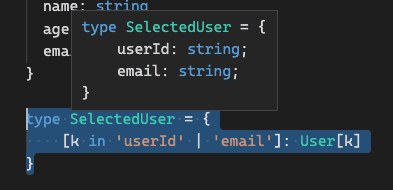yceffort
소프트웨어 개발 원칙 중의 하나인 DRY, don't repeat yourself 는 너무나도 유명해서 별로 설명할게 없긴한다. type을 잘 사용하면, 조금 더 효과적으로 소프트웨러를 설계할 수 있다.
타입 확장하기
interface Person {
name: string
age: number
}
// don't
interface PersonWithBirthday {
name: string
age: number
birth: Date
}
// do
interface PersonWithBirth extends {
birth: Date
}
type을 사용한다면, &으로도 가능하다.
type PersonWithBirth = Person & {birth: Date}
타입 좁히기
이전 예제와 반대의 예제를 들어보자. 이번엔 큰 타입에서 작은 타입의 subset이 필요한 경우다.
interface User {
userId: string
name: string
age: number
email: string
}
interface SelectedUser {
userId: string
email: string
}
이 역시 중복이 발생하므로, 좋지 못한 방법이다.
type SelectedUser = {
userId: User['userId']
email: User['email']
}
interface SelectedUser {
userId: User['userId']
email: User['email']
}
오오 놀랍다. 타입의 값을 마치 객체에서 값을 꺼내온 것마냥 썼다. 이렇게 해두면, User의 userId가 number로 바뀌게되도, 자동으로 그 타입도 따라가게 될 것이다.
하지만 이 역시도 번거로운 점이 있다. key조차도 나는 똑같이 할 건데, 굳이 키를 다시 선언할 필요가 있을까?
type SelectedUser = {
[k in 'userId' | 'email']: User[k]
}

오옹 신기하다. 하지만 이미 우리는 이것보다 더 편한 방법을 알고 있다.
type SelectedUser = Pick<User, 'userId' | 'email'>
Pick 을 쓰면 간단하게 해결할 수 있다.
공통타입 추출하기
interface Save {
action: 'save'
body: string
id: string
}
interface Load {
action: 'load'
body: string
id: string
}
type Action = Save | Load
type ActionType = 'save' | 'load' // Repeat!
두 타입은 action의 값 외엔 모든게 똑같은데, 여기서 action을 또다른 타입으로 추려내기 위해서 'save' | 'load'를 썼다. 이것도 마찬가지로, 아래 처럼 바꿀 수 있다.
type ActionType = Action['action'] // type ActionType = "save" | "load"
타입 옵셔널하게 사용하기
객체의 모든 키가 옵셔널 하다면 어떻게 해야할까? 일일히 모두 물음표를 달아야할까?
interface Person {
age?: number
name?: string
email?: string
gender?: string
}
그렇지 않다. Partial<Person>을 사용하면, 안에 있는 모든 키를 옵셔널하게 바꿔준다. 이는 옵셔널한 값을 받는 상황 (api로 값을 업데이트 한다던지)에 매우 유용하게 쓸 수 있다.
function update(options: Partial<Person>) {
// .. 적당히 값을 받아서 처리한다.
}
값으로 부터 타입을 추출하기
기본적으로 개발 흐름은 타입을 선언하고 값을 쓰는 형태로 가지만, 반대인 경우가 있을 수 있다. 이 경우에는 아래와 같이 하면 된다.
const INIT_VALUES = {
width: 640,
height: 480,
price: 150_000,
name: 'monitor',
}
type Options = typeof INIT_VALUES
// 위 타입은 아래와 같다.
// type Options = {
// width: number;
// height: number;
// price: number;
// name: string;
// }
한가지 조심해야 할 것은, typeof의 사용이다. 아래 두 코드는 엄연히 다르다.
const t = typeof INIT_VALUES // "object"
type o = typeof options
// type Options = {
// width: number;
// height: number;
// price: number;
// name: string;
// }
값을 선언한 코드에 typeof를 때리면 자바스크립트 런타임의 typeof를 실행하게 된다. 값을 가져오고 싶은건지, type을 가져오고 싶은건지 확실히 해야 한다. 조건문 같은 곳에 typeof를 둔다면 자바스크립트 런타임의 typeof를 실행한다는 것을 명심하자. type에 typeof를 쓰면, 타입스크립트만 알아듣는다.
이렇게 쓰긴했지만, 어디까지나, 타입을 먼저쓰고 값을 쓰는 경우가 훨씬 더 일반적이고 정확하다.
함수의 결과를 타이핑 하기
함수의 결과를 타이핑하고 싶다면, ReturnType과 제네릭을 활용하면 된다.
function getUserInfo(userId: string) {
// ...
return {
userId,
name: 'hello',
age: (Math.random() * 100) / 100,
email: 'random@email.com',
}
}
type userInfo = ReturnType<typeof getUserInfo>
// 위와 같다.
// type userInfo = {
// userId: string;
// name: string;
// age: number;
// email: string;
// }
이러한 패턴은 라이브러리에서 함수의 리턴을 emit할 때 많이 쓴다. 주의할 점은, 제네릭에 getUserInfo가 아니고 typeof gerUserInfo가 들어갔다는 점이다. ReturnType는 타입을 제네릭으로 받아야 한다.
type t = typeof getUserInfo
// 위와 같다.
// type t = (userId: string) => {
// userId: string;
// name: string;
// age: number;
// email: string;
// }
이로써 함수만 바꾸더라도, 타입까지 자동으로 바뀌어서 single source of truth를 지킬 수 있었다.
제네릭으로 파라미터 제한하기
제네릭 타입은 함수를 위한 타입과 같다. 그리고 함수가 DRY 원칙을 지키기 위한 수단인 것을 감안했을때, 제네릭도 마찬가지로 타입의 DRY를 위한 필수 요소라고 볼 수 있다.
interface Name {
first: string
last: string
}
type PairProgrammer<T extends Name> = [T, T]
const day1: PairProgrammer<Name> = [
{last: 'KIM', first: 'YONGCHAN'},
{last: 'LEE', first: 'JAEYONG'},
]
const day2: PairProgrammer<Name> = [
{last: 'KIM'}, // Property 'first' is missing in type '{ last: string; }' but required in type 'Name'.
{last: 'LEE'}, // Property 'first' is missing in type '{ last: string; }' but required in type 'Name'.
]
한가지 조금 개인적으로 아쉬운것은, 제네릭 파라미터를 생략할 수 없다는 점이다.
PairProgrammer<Name>대신PairProgrammer를 쓸 수 없다는 점이다.
Pick 구현해보기
이렇게 extends 키워드까지 활용한다면, Pick과 동일한 타입을 추출하는 나만의 Pick을 만들 수 있다.
type MyPick<T, K extends keyof T> = {
[k in K]: T[k]
}